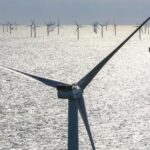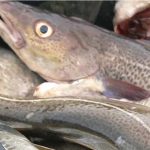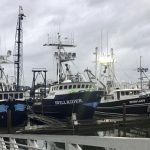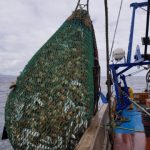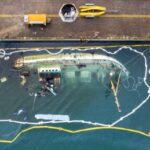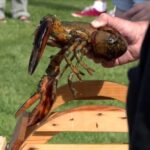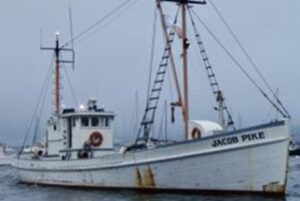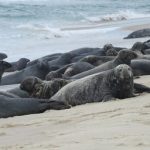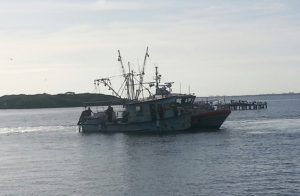Daily Archives: July 25, 2016
National Marine Fisheries Service Announces Final Rule to Adjust the 2016 North and South Atlantic Swordfish Quotas
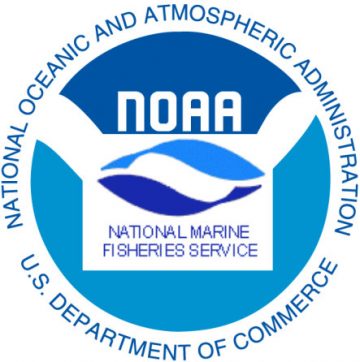 This final rule adjusts the 2016 annual North and South Atlantic swordfish quotas based on 2015 underharvests and international quota transfers, and modifies the annual quota adjustment public notice in certain circumstances. The final adjusted quota for North Atlantic swordfish is 3,359.4 metric tons (mt) dressed weight (dw). This quota is allocated as follows: the directed category quota = 3,009.4 mt dw; the incidental category = 300 mt dw; and the reserve category = 50 mt dw. The final adjusted quota for South Atlantic swordfish is 75.1 mt dw. Read the rest here National Marine Fisheries Service Announces Proposed Rule To Remove Vessel Upgrade Restrictions For Swordfish Directed And Atlantic Tuna Longline Category Limited Access Permits Read the rest here 16:41
This final rule adjusts the 2016 annual North and South Atlantic swordfish quotas based on 2015 underharvests and international quota transfers, and modifies the annual quota adjustment public notice in certain circumstances. The final adjusted quota for North Atlantic swordfish is 3,359.4 metric tons (mt) dressed weight (dw). This quota is allocated as follows: the directed category quota = 3,009.4 mt dw; the incidental category = 300 mt dw; and the reserve category = 50 mt dw. The final adjusted quota for South Atlantic swordfish is 75.1 mt dw. Read the rest here National Marine Fisheries Service Announces Proposed Rule To Remove Vessel Upgrade Restrictions For Swordfish Directed And Atlantic Tuna Longline Category Limited Access Permits Read the rest here 16:41
Prosecutors dismiss charges against indicted fishing magnate Carlos Rafael’s bookkeeper
Federal prosecutors moved Monday to dismiss the charges against Dartmouth resident Debra Messier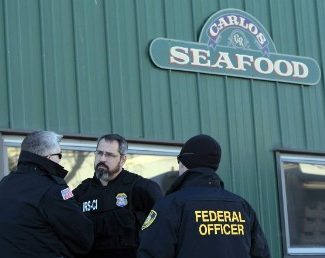 , the longtime bookkeeper for indicted fishing magnate Carlos Rafael, after her case had sat largely idle since her February arrest. The motion clears Messier of potential penalties ahead of Rafael’s federal trial, slated for January 2017 at U.S. District Court in Boston. Rafael and Messier were arrested Feb. 26 on charges of conspiracy and submitting falsified records to the government, after federal authorities raided the Carlos Seafood building on New Bedford’s waterfront.Messier was released from custody the same day on a $10,000 bond. Prosecutors said Monday’s dismissal motion was filed “in the interests of justice.” Prosecutors allege that Rafael, for years and with Messier’s help, lied to federal authorities about the amount and kinds of fish caught by his New Bedford-based fleet, in order to evade federal fishing quotas. Read the story here 14:29
, the longtime bookkeeper for indicted fishing magnate Carlos Rafael, after her case had sat largely idle since her February arrest. The motion clears Messier of potential penalties ahead of Rafael’s federal trial, slated for January 2017 at U.S. District Court in Boston. Rafael and Messier were arrested Feb. 26 on charges of conspiracy and submitting falsified records to the government, after federal authorities raided the Carlos Seafood building on New Bedford’s waterfront.Messier was released from custody the same day on a $10,000 bond. Prosecutors said Monday’s dismissal motion was filed “in the interests of justice.” Prosecutors allege that Rafael, for years and with Messier’s help, lied to federal authorities about the amount and kinds of fish caught by his New Bedford-based fleet, in order to evade federal fishing quotas. Read the story here 14:29
BOEM releases draft plan for Lower Cook Inlet oil leasing
 Residents of Anchor Point, Homer and Seldovia could see drilling rigs off their coasts in the future if the federal Department of the Interior gives it the green light. The Bureau of Ocean Energy Management, the federal agency that oversees offshore drilling on the Outer Continental Shelf, has issued a draft environmental impact statement for oil and gas exploratory leases in Lower Cook Inlet. The proposed leasing area stretches from approximately Ninilchik to just north of Augustine Island, not including Kachemak Bay. The state oversees oil and gas leases on lands within 3 nautical miles of shore, and the federal government has jurisdiction on lands past that. There are currently no rigs in Alaska in federal waters, said John Callahan, a spokesman for the Bureau of Ocean Energy Management. Read the rest here 12:30
Residents of Anchor Point, Homer and Seldovia could see drilling rigs off their coasts in the future if the federal Department of the Interior gives it the green light. The Bureau of Ocean Energy Management, the federal agency that oversees offshore drilling on the Outer Continental Shelf, has issued a draft environmental impact statement for oil and gas exploratory leases in Lower Cook Inlet. The proposed leasing area stretches from approximately Ninilchik to just north of Augustine Island, not including Kachemak Bay. The state oversees oil and gas leases on lands within 3 nautical miles of shore, and the federal government has jurisdiction on lands past that. There are currently no rigs in Alaska in federal waters, said John Callahan, a spokesman for the Bureau of Ocean Energy Management. Read the rest here 12:30
World first Anglesey underwater energy ‘sea kite’ project in licence bid
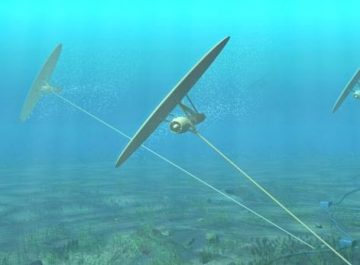 Swedish-based Minesto has applied to fix its underwater energy ‘kites’ in the sea off Holyhead on Anglesey. It is part of plans for a 10MW underwater power plant, supplying the power needs of about 8,000 households. Developers said it would be the first full-scale operation of its kind in the world, following quarter-scale ocean testing off Northern Ireland. The technology uses tidal currents to force water through a turbine as the underwater kites “fly” through the sea. Read the rest here 11:39
Swedish-based Minesto has applied to fix its underwater energy ‘kites’ in the sea off Holyhead on Anglesey. It is part of plans for a 10MW underwater power plant, supplying the power needs of about 8,000 households. Developers said it would be the first full-scale operation of its kind in the world, following quarter-scale ocean testing off Northern Ireland. The technology uses tidal currents to force water through a turbine as the underwater kites “fly” through the sea. Read the rest here 11:39
Joe Henry, ‘the fox’ of lobstermen, to lead Stonington’s Blessing of Fleet parade on Sunday
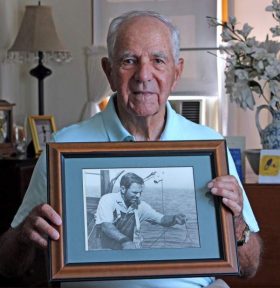 Back in the day, Joe Henry was really good at lobstering, so good in fact, that his fellow lobstermen in the Borough would call him “the fox” because he was so sly, knew all the best places to find the crustaceans and would always bring in the largest catch. “I did it for a good 50 years and would often bring in 200 to 300 pounds in one tide. Those were the good old days,” the 90-year-old resident said while holding a photo of himself lobstering nearly 40 years ago. “I was a lobsterman all my life. It’s just what I did.” His dedication to the local fishing and lobstering industry and to the sea is the reason that Mike and Georgia Crowley, organizers of the 63rd annual Blessing of the Fleet, asked him to be the grand marshal for the procession during this year’s event. Read the rest here 10:39
Back in the day, Joe Henry was really good at lobstering, so good in fact, that his fellow lobstermen in the Borough would call him “the fox” because he was so sly, knew all the best places to find the crustaceans and would always bring in the largest catch. “I did it for a good 50 years and would often bring in 200 to 300 pounds in one tide. Those were the good old days,” the 90-year-old resident said while holding a photo of himself lobstering nearly 40 years ago. “I was a lobsterman all my life. It’s just what I did.” His dedication to the local fishing and lobstering industry and to the sea is the reason that Mike and Georgia Crowley, organizers of the 63rd annual Blessing of the Fleet, asked him to be the grand marshal for the procession during this year’s event. Read the rest here 10:39
Shrimpers say blackgill mystery may wait in the St. Simons Sound
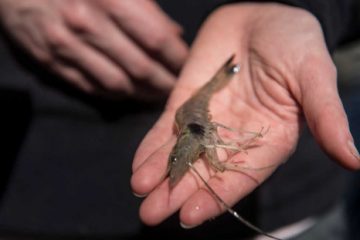 The crippling blackgill disease first appeared in local waters during the 1996 shrimping harvest, roughly six years after the last time state officials had permitted trawlers to operate in the St. Simons Sound. The parasitic disease, which affects reproduction and vigor in shrimp, is already showing up in the 2016 harvest that started June 1. It marks the earliest point in the season that blackgill has ever appeared in the harvest, according to Lindsey Aubart, a marine biologist with the state Department of Natural Resources. Scientists and marine biologists such as Aubart have studied the blackgill problem for years in search of a source and solution to the mysterious disease, which occurs from the Chesapeake Bay to the Gulf of Mexico but is most prominent in the waters of Georgia and South Carolina. Locally, a lot of experienced shrimpers suspect the answers may be found in those long-fallow shrimping waters of the St. Simons Sound. Read the rest here 08:46
The crippling blackgill disease first appeared in local waters during the 1996 shrimping harvest, roughly six years after the last time state officials had permitted trawlers to operate in the St. Simons Sound. The parasitic disease, which affects reproduction and vigor in shrimp, is already showing up in the 2016 harvest that started June 1. It marks the earliest point in the season that blackgill has ever appeared in the harvest, according to Lindsey Aubart, a marine biologist with the state Department of Natural Resources. Scientists and marine biologists such as Aubart have studied the blackgill problem for years in search of a source and solution to the mysterious disease, which occurs from the Chesapeake Bay to the Gulf of Mexico but is most prominent in the waters of Georgia and South Carolina. Locally, a lot of experienced shrimpers suspect the answers may be found in those long-fallow shrimping waters of the St. Simons Sound. Read the rest here 08:46
When residents of an Alaska fishing village can’t fish, normal life comes to an end
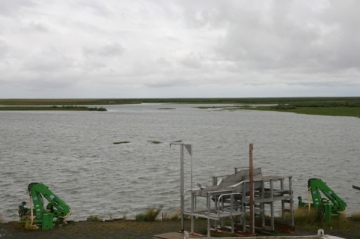 Expensive fishing nets sit on the hardware store shelves, unsold. Families struggle to buy baby diapers, back-to-school clothes and gasoline for boats that take them to favorite berry-picking spots. Some people have seen their water cut off for lack of payment. Normal life is being upended in Quinhagak, a Southwest Alaska fishing village with no fishing this year for the commercial fleet. Skiffs are ready, kings were plentiful, silvers are starting to show up and brokers from the Seattle area who flew to the village say markets are eager for wild Alaska salmon. Frustrated fishermen and village leaders say the problem is their region’s community development nonprofit, which they say provides high salaries for executives and generous stipends for board members but no extra relief for this new stress in what’s already one of the poorest parts of the United States. “They left us with nothing,” said Frank Hill, 44, who had worked as dock supervisor for Coastal Villages. “It’s hard when you have five kids to take care of.” Read this story here 08:23
Expensive fishing nets sit on the hardware store shelves, unsold. Families struggle to buy baby diapers, back-to-school clothes and gasoline for boats that take them to favorite berry-picking spots. Some people have seen their water cut off for lack of payment. Normal life is being upended in Quinhagak, a Southwest Alaska fishing village with no fishing this year for the commercial fleet. Skiffs are ready, kings were plentiful, silvers are starting to show up and brokers from the Seattle area who flew to the village say markets are eager for wild Alaska salmon. Frustrated fishermen and village leaders say the problem is their region’s community development nonprofit, which they say provides high salaries for executives and generous stipends for board members but no extra relief for this new stress in what’s already one of the poorest parts of the United States. “They left us with nothing,” said Frank Hill, 44, who had worked as dock supervisor for Coastal Villages. “It’s hard when you have five kids to take care of.” Read this story here 08:23
Maine fishermen testing a ‘game-changer’ for protected cod in the Gulf of Maine
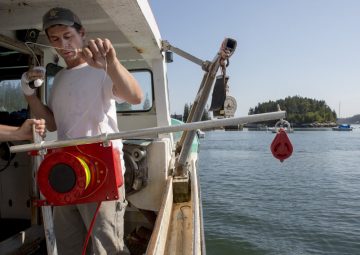 Like many Maine fishermen, Bryan Kelley faces a dilemma as he looks to diversify beyond the lobster that account for the bulk of his catch. To target pollock, which are relatively common in the Gulf of Maine, he has to fish in the same areas frequented by cod, a type of groundfish protected through strict federal catch limits. “We literally have to stay away from the codfish,” Kelley said while standing on his 40-foot boat moored in the Five Islands harbor of Georgetown. “I could fill this with codfish if I wanted to, but that wouldn’t help anybody in this sector and that is not why we are out here.” To help him catch the groundfish he wants and avoid the species he doesn’t, Kelley has begun experimenting with a contraption akin to a conventional fishing reel on steroids and with an electronic brain. The “automatic jigging machines” loaned to Kelley and a handful of other fishermen by The Nature Conservancy allow them to more accurately target the water column where pollock hang out and stay off the bottom where cod lurk. Read the rest here 07:49
Like many Maine fishermen, Bryan Kelley faces a dilemma as he looks to diversify beyond the lobster that account for the bulk of his catch. To target pollock, which are relatively common in the Gulf of Maine, he has to fish in the same areas frequented by cod, a type of groundfish protected through strict federal catch limits. “We literally have to stay away from the codfish,” Kelley said while standing on his 40-foot boat moored in the Five Islands harbor of Georgetown. “I could fill this with codfish if I wanted to, but that wouldn’t help anybody in this sector and that is not why we are out here.” To help him catch the groundfish he wants and avoid the species he doesn’t, Kelley has begun experimenting with a contraption akin to a conventional fishing reel on steroids and with an electronic brain. The “automatic jigging machines” loaned to Kelley and a handful of other fishermen by The Nature Conservancy allow them to more accurately target the water column where pollock hang out and stay off the bottom where cod lurk. Read the rest here 07:49
































